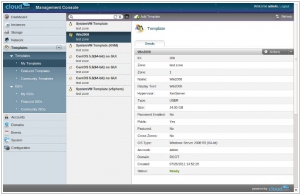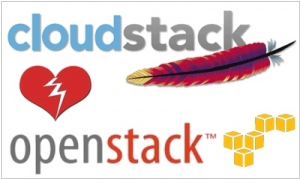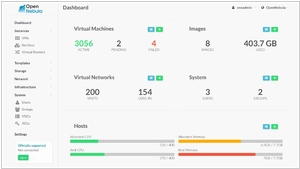CloudStack vs OpenNebula
July 30, 2023 | Author: Michael Stromann
8

Apache CloudStack is open source software designed to deploy and manage large networks of virtual machines, as a highly available, highly scalable Infrastructure as a Service (IaaS) cloud computing platform. CloudStack is used by a number of service providers to offer public cloud services, and by many companies to provide an on-premises (private) cloud offering, or as part of a hybrid cloud solution.
See also:
Top 10 Cloud Management platforms
Top 10 Cloud Management platforms
CloudStack and OpenNebula are both open-source cloud computing platforms, each offering unique features and functionalities. CloudStack is an Infrastructure as a Service (IaaS) cloud management platform that provides a comprehensive set of tools for deploying and managing cloud infrastructures. It offers features like virtual machine management, networking, storage, and user management, making it suitable for organizations seeking a robust and scalable cloud solution. On the other hand, OpenNebula is a more flexible and lightweight cloud management platform that focuses on simplicity and ease of use. It enables users to build and manage private, public, and hybrid clouds with ease, offering features like virtual machine management, storage, and monitoring.
See also: Top 10 Cloud Management platforms
See also: Top 10 Cloud Management platforms
CloudStack vs OpenNebula in our news:
2012. Cloud Computing benefit? Working from home in the nude

Citrix (one of the leading players on the Cloud Computing market) wondered what ordinary people think about Cloud Computing. It interviewed a thousand of ordinary Americans, and here's what they get. Only 16 percent correctly responded that Cloud Computing is a computer network to store, access and share data from Internet-connected devices. Other answers included: "An actual fluffy white Cloud", "Something related to the weather", "A pillow", "Outer space", "A movie", "A place to meet", "Toilet paper". 54 percent of respondents claim to never use Cloud Computing (although judging by the answers to other questions, 95% of them actually used). ***
2012. OpenStack launches. CloudStack departs. Amazon adapts SAP. Azure rebrands

Here is the news digest from the leading cloud platforms. First of all, the open-source platform OpenStack (aka Linux for the clouds) which had been developed for two years by the alliance of IT giants (Rackspace, NASA, Citrix, Intel, AMD, Cisco, Dell, HP, IBM ...) - finally comes to production. Since May 1, it was adapted by RackSpace for its service Rackspace Cloud Files and last week HP launched the public beta of its HP Cloud platform, based on OpenStack. However, a week before the launch the trouble (common for open-source projects) occurred with OpenStack. Citrix, which has been one of the first participants in OpenStack, suddenly decided to grant its own cloud platform - CloudStack - to Apache Software Foundation. Thus, CloudStack not flowed into OpenStack but became a rival project. Citrix explained this decision by the slow OpenStack development and unwillingness of other parties to integrate with Amazon Web Services APIs. ***
2011. Citrix acquired cloud platform Cloud.com

Virtualization and Cloud Computing have become closely intertwined technologies in recent years, with market leaders in virtualization striving to establish themselves as leading providers of cloud platforms. Microsoft introduced Windows Azure, VMWare launched vCloud, and most recently, Cloud Foundry entered the scene. Citrix, the third giant in virtualization, has now made its move into the Cloud. Until now, Citrix primarily supplied software for private clouds without its own cloud infrastructure. However, today, Citrix acquired the cloud provider Cloud.com for an estimated amount between $200 and $250 million. Cloud.com boasts an impressive client roster including Zynga, Tata, and GoDaddy. Notably, Cloud.com leverages the open-source platform OpenStack as its cloud operating system, which was developed by an alliance led by RackSpace. Citrix is also a participant in this alliance and, following the acquisition of Cloud.com, plans to continue supporting OpenStack and integrating it with its own virtualization technologies.




